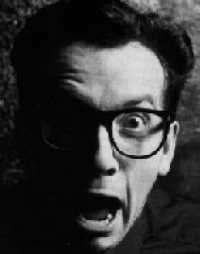DECLAN MCMANUS'S father was a jazz bandleader, and he was often given copies of the popular records of the day, which he passed on to his son. It was these recordings by the Beatles, the Kinks, the Who, and the stars of Motown that instilled in McManus a love of rock and roll and laid the foundation for his own musical style. When he graduated from high school in Liverpool, he found a day job as a computer operator (a profession that placed such a strain on his eyes that he began wearing his now signature glasses) and played clubs at night. In 1974, he moved to London and became front man for a country-rock group called Flip City. As the group's songwriter, he was soon recording demos, which he began sending to British record companies in hopes of landing a deal for himself. The only taker was Stiff Records, an emerging label in the punk and new wave scene. There he met Nick Lowe, who would become his longtime collaborator, and Jake Riviera, who would later become his manager. It was Riviera who gave McManus
the idea to change his name: "Elvis" was chosen as a challenge to the rock establishment, and "Costello" was McManus's mother's maiden name.
Costello was given only twenty-four hours of studio time to record his first album, and was backed by an American country-western bar band named Clover (their lead singer at the time, who didn't participate in the sessions, was Huey Lewis). Two singles, "Less Than Zero" and "Alison," were released with little fanfare. In a desperate attempt to secure a distribution deal, Costello strapped a Pignose amplifier on his back and played in front of the Hilton in London, where a CBS Records international convention was taking place. He was soon arrested, but he signed with the label.
His first album, titled My Aim Is True, was released in 1977 on Columbia, and was immediately hailed as one of the finest debuts in rock history. It was embraced by the new wave and punk underground scene for its energy and scathing, cynical observations on relationships and sexual misadventures (Costello said at the time his motivation came from "revenge and guilt"); critics loved it for its literacy and eclectic musical ideas, and went so far as to vote it "Album of the Year" in Rolling Stone's annual poll. Costello assembled a backing band called the Attractions and began touring America, where he managed to anger the staff of Saturday Night Live by replacing "Less Than Zero" with "Radio, Radio" (the band played the opening strains of the former and without stopping, launched into the latter, a scathing indictment of radio, the music industry, and for that moment, U.S. network television).
My Aim Is True was followed by the harder-edged and higher-charting This Year's Model (the Attractions' studio debut), which included the radio staple "Pump It Up." His next album, Armed Forces, was originally titled Emotional Fascism, which neatly summed up the album's content — it dealt with the fascism of both politics and love, and, caustic as it was, it reached the Top 10. Soon after the album's release, Costello, in a drunken stupor at a bar in Columbus, Ohio, made racial slurs about two of America's greatest black musicians, Ray Charles and James Brown, in an effort to bring to a swift conclusion an argument with members of another act. The incident was bandied about in the press and continued to haunt him for years: after almost two decades, his profuse apologies, and repeated efforts to explain the context of his remarks, it has slowly receded into the background.
The band returned to England not knowing if they could ever tour America again, and as a reaction to the whole debacle, they ironically titled their new album Get Happy!! In quick succession, Costello released Almost Blue, a "country record" of Nashville standards, and Trust, in which he returned, somewhat unsuccessfully, to pop. His next album, Imperial Bedroom, was hailed by the critics as a pop masterpiece in the same vein as the Beatles' and Beach Boys' best work, but follow-ups Punch the Clock, with its single "Everyday I Write The Book," and Goodbye Cruel World, with the Daryl Hall duet "The Only Flame in Town," were less ambitious, and Costello seemed in disarray.
By 1986, both his marriage and his band had begun to disintegrate. He recorded King of America with the Confederates, a group of accomplished session musicians, a few of whom had at one time backed the other Elvis. Costello turned his confusion into an advantage for the tour that followed, performing with the Confederates, the Attractions, and as a solo performer. He and the Attractions were able to hang together through Blood and Chocolate, but after that, he abruptly left the band to pursue a solo career. He also left his wife and married Caitlin O'Riordan, former bassist of the Pogues. In 1991, he released Mighty Like a Rose, which completed his break with the past; he sported a new look and performed songs that Rolling Stone called (ambitious and adventurous.
Costello was even more adventurous on his next album, The Juliet Letters (1993): he worked with the Brodsky Quartet in a collaboration that mixed pop with chamber music — an interesting effort, but a commercial dud. In 1994, he reunited with the Attractions and released Brutal Youth, which hearkened back to his more rocking pop roots. His latest album, All This Useless Beauty, a combination of new songs and tunes he wrote and gave to other artists, was released in 1996, as was Costello & Nieve, a five-CD set culled from a series of small-club concerts.
